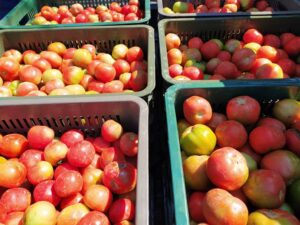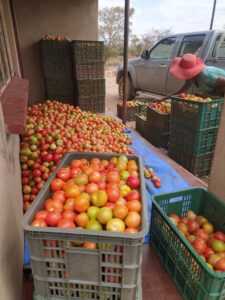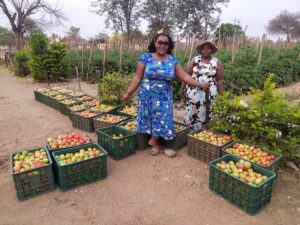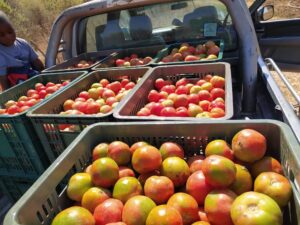Organic Farming: A New Core for EU-Africa Relationship For Developing Inclusive Livelihoods & Agri-Food Systems
- 01
- Oct

Patisiwe Green Garden, Gokwe, Zimbabwe
Organic farming
Going organic has been the standard of sustainability nowadays. In fact, it is believed that sustainability branding does not only makes a business stands out, but the marketing strategy surrounding it will outsmart competitors since it helps also to serve the better good purpose – the planet. On 23 September 2021, The EU celebrated Organic EU Day, which is a day to help create awareness for EU citizens about the importance of organic production, encourage organic consumption and keep up with the EU promised of a climate-neutral Europe by 2050. But what does that mean to Europe and the rest of the world is what this blog is out to explore. The focus is on plant-based organic crops.
Europe with its EU Green Deal wants to combat climate change and reduce CO2 emissions by 55% in 2030 as well as having 25% of the EU’s agricultural land under organic farming. By 2050 EU wants to be climate neutral and sustainable. With the sustainability plans put forth by the EU, Europe will be the first continent to be carbon-free and sustainable. To get there, the EU has a formula, a roadmap, a solution what others will call a blueprint to get there. This formula incorporates green solutions that touch on different sectors in the economy like transport, energy, agriculture, infrastructure and ICT etc.
The Organic EU Day is part of Europe’s plans of going sustainable derived from the Action Plan for the development of organic production, with the aim to “boost substantially the production and consumption of organic products in order to contribute to the achievement of the Farm to Fork and Biodiversity strategies’ targets such as reducing the use of fertilisers, pesticides and anti-microbials.” But what does that imply?
What does organic farming mean for the EU?
Organic production in Europe means that companies producing for instance fruits and vegetables have to follow strict rules and regulations set forth by the European Union to be labelled organic especially when it comes to high-quality standards and safety. This is because organic fetches premium prices for products labelled as organic. As such people like to have proof that the product is genuinely organic.
It also means that farmers will be using natural resources like the soil and water in a responsible way that will help to nurture biodiversity, maintain ecological balance and preserve and enhance the quality of the natural resources.
It further means that consumers will be able to make a conscious decision about what they eat and how that will positively affect the planet. It is important to mention here that with sustainability consumers are king for their decision to buy or not to makes all the difference. EU consumers, in particular, want to know the origin of their product and that it is sourced in a sustainable way like no additive, chemical, child labour, is pure and have a greater good impact in the community. As earlier mentioned, they need proof that is genuinely organic.
In addition to this, there should be a new arrange agreement between the EU and partners to equally promotes sustainable development especially in less privileged countries like the case of the Generalised Scheme of Preferences (GSP) that was proposed by the European Commission for 2024-2034. In essence, GSP is out to encourage trade between the EU and low-income countries by reducing import duties of products coming from these countries.
It finally means that as Europe is promoting organic farming and consumption for its citizens, the import of organic products should be key so as to complement this process. This is because no country is an island to be able to provide everything for itself. Covid 19 has illustrated how the concept of collaboration and partnership is key to the success in today’s world. Since it was seen that no country could slow down the virus alone. At the same time, this cooperation between continents, countries, businesses should be fair, inclusive and sustainable.
What does this mean to the rest of the world?
What this means to the rest of the world like Africa in particular is that they have a chance to trade in organic goods and have a sustainable trade in the international market and with Europe. Europe has always been Africa’s number one trading partner in terms of goods, manufacturing products and now technology. Following the regulations of organic farming to some farmers is challenging even in the EU. For it has forced some farmers to move to other countries to continue with farming where the rules are more flexible or some have simply declared bankrupt. One EU citizen confirmed this statement by saying “farmers cannot sustain their activity in Europe with the actual regulations and taxes” This is the reason why organic food must be imported. It is a better alternative to maintain food security. More importantly, it will be a new core for the EU-Africa relationship for developing inclusive livelihoods & agri-food systems for low-income countries like Africa.

Patisiwe Green Garden, Gokwe, Zimbabwe
Advantages of importing organic food
First, it is a smart way to empower producers in general and those in low-income countries in particular. Farmers are motivated to engage in activities that they see some benefits especially financial benefits. When farmers are trained to produce organic crops and have a market guarantee for their products, it will help to reduce the dependence on developmental aid/subsidy. Developmental aids have tried for decades to improve things in Africa with mixed results. Part of the reason has been that there are not so many commitments to the project. What most farmers need at this stage at least with the ones that we at EuroAfri Link work with is access to markets for their products and growth funds for their businesses with minimum interest rates.
Also, farmers will be able to eat what they produce and have a healthy diet and sell the rest for additional income. A win-win scenario.
Again, farmers will be able to improve their quality of life and live a dignified life. Do things that they could otherwise not be able to do because of financial poverty limiting them. With the additional income from trade, they can be able to do these things and more.
It means Europe can also export organic products to the rest of the world and also create wealth from it while protecting people and the planet.
Finally, Farmers will be motivated to engage in organic farming because of the dividends they get at the end.

Patisiwe Green Garden, Gokwe, Zimbabwe

Our recommendations
- Europe should open its markets more to organic products from low-income countries like Africa.
- Create enabling policies environment that encourages international trade like with GSP.
- Give incentive to farmers to encourage organic farming.
- Cooperate with a go-to company/organisation that promotes organic products and their consumption, also with products produced out of Europe.
- Sensitize consumers about the health benefit of organic products like the case of avocados, fresh tomatoes etc.
EuroAfri Link’s main goal is to create a trade channel between African farmers and European consumers using technologies in the Supply Chain for agri products, and capacity development for future scale-up and sustainability of the business.
Be part of the solution. You can support our goal by buying EU standards organic products from farmers in Africa and transferring technologies that are incentives to farmers!
Author: Patience Chindong, co-founder EuroAfri Link. Special thank you to Patisiwe Zaba for the great photos
